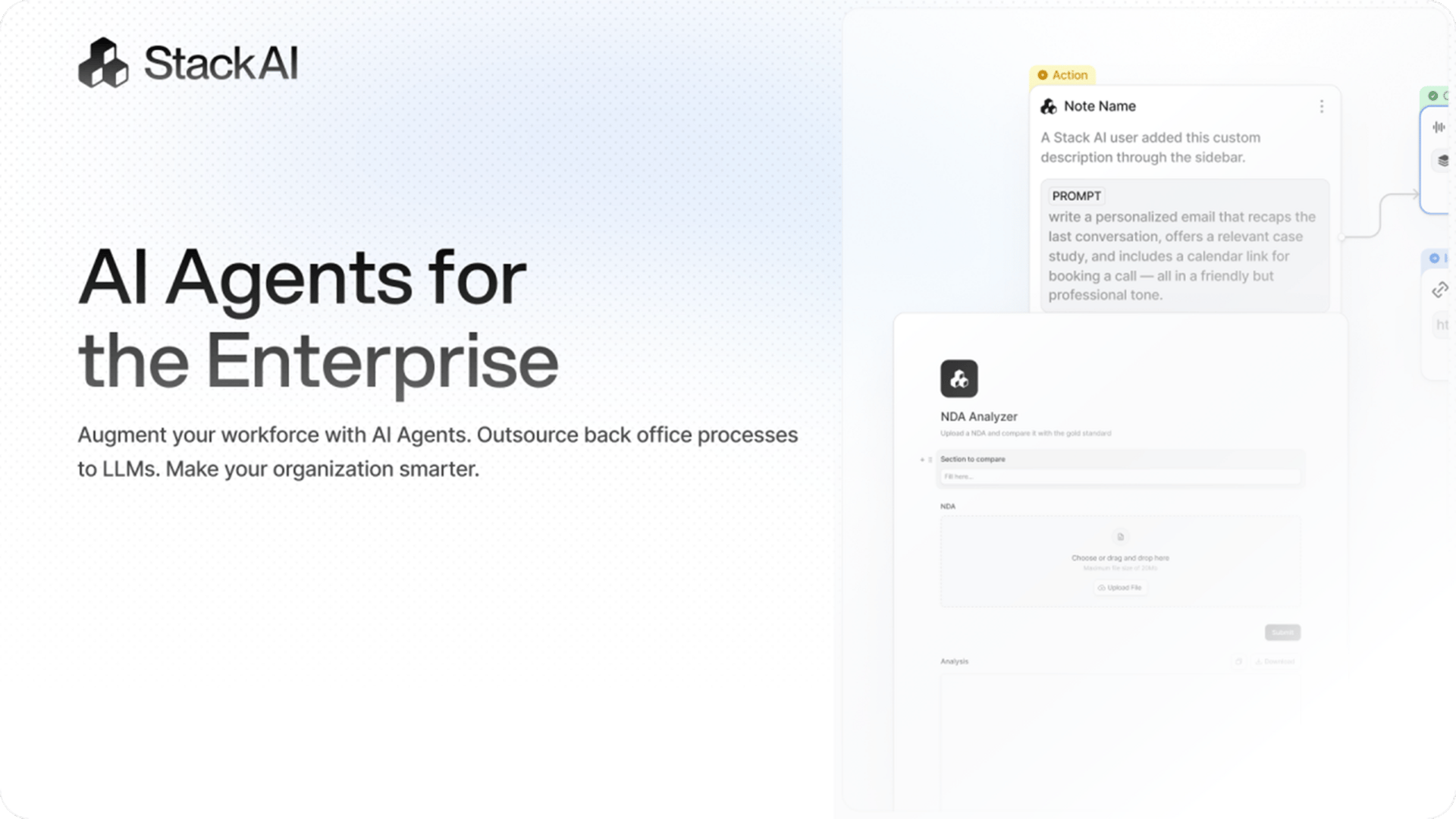- Generative AI Enterprise
- Posts
- CEO advisory firm unveils AI strategy playbooks
CEO advisory firm unveils AI strategy playbooks
Plus, ChatGPT’s productivity impact, the U.S. AI Action Plan, and more.
Edition sponsored by
WELCOME, EXECUTIVES AND PROFESSIONALS.
AI is unquestionably reshaping the market, but it should not upend sound value-creation principles.
Since the previous edition, we’ve reviewed hundreds of the latest agentic and generative AI best practices, case studies, market dynamics and innovation insights. Here’s the top 1%...
Note: Effective August 17, 2025, this briefing will be renamed Enterprise AI Executive. The content and sender email address will remain unchanged.
In today’s briefing:
CEO advisory firm unveils AI software strategies.
OpenAI explores sector-level productivity gains.
The U.S. launches AI Action Plan.
Microsoft assesses AI’s impact across occupations.
Transformation and technology in the news.
Career opportunities & events.
Read time: 4 minutes.

PLATFORM STRATEGY
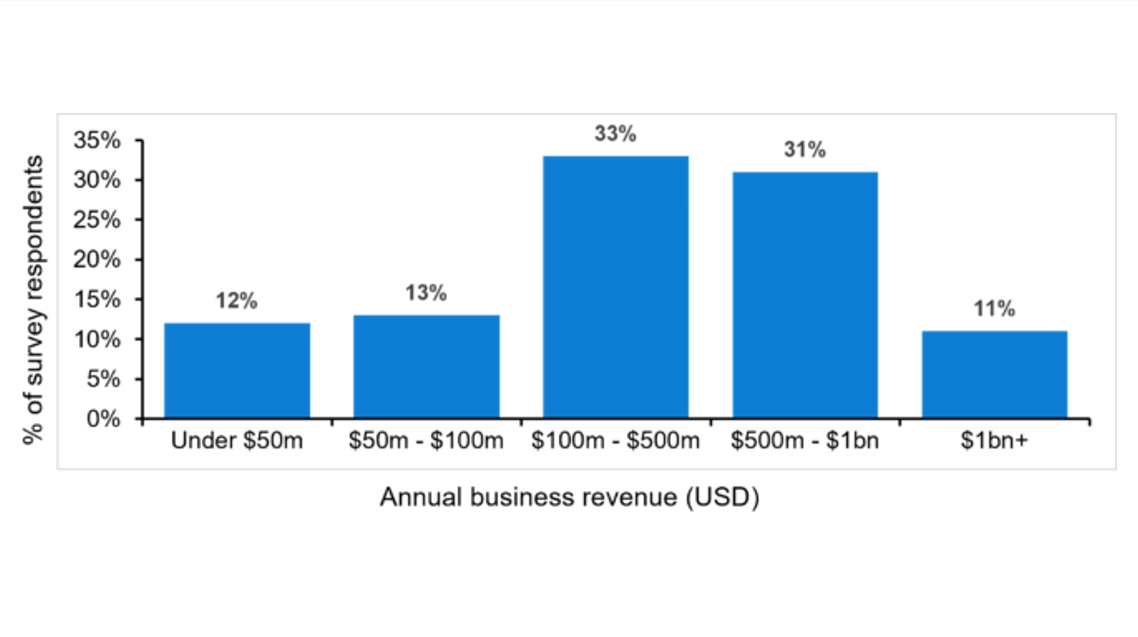
Image source: Teneo
Brief: CEO advisory firm Teneo published four playbooks on how AI is reshaping the software landscape and how incumbents can adapt their strategies and operations to stay competitive against AI-native disruptors.
Breakdown:
Leveraging insights from 300+ software vendors, Teneo’s guidance supports disciplined decision-making across four core areas.
The product strategy playbook emphasizes that control of proprietary data and APIs, more than feature count, is now the defining moat.
The pricing playbook outlines pricing and packaging strategies, including why splitting AI into a separate tier or add-on can often backfire.
The GTM playbook shows how to win in non-linear AI buying journeys, shaped by a growing number of digital and human touchpoints.
The customer success playbook emphasizes how outcome-based models help align professional services with customer ROI.
Why it’s important: AI is central to growth for most software firms, presenting vast opportunities to create value but also real threats. Companies that stray from decisions based on customer value, competitive positioning, and margin discipline because “AI changes everything” are unlikely to succeed.
PRESENTED BY STACKAI
Brief: StackAI runs securely on-prem or in your private cloud. SOC 2 Type II. GDPR & HIPAA compliant — built for enterprise governance and data protection.
StackAI offers:
Role-based access, audit trails & policy control
Native integrations with core enterprise systems
White-glove onboarding & support
ENTERPRISE PRODUCTIVITY
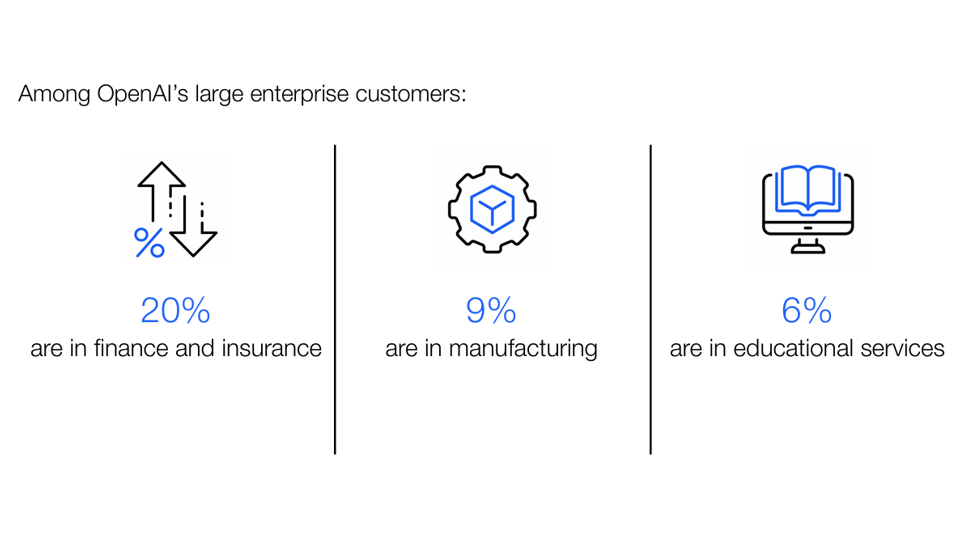
Image source: OpenAI
Brief: OpenAI released an initial look at ChatGPT’s impact on productivity, an important driver of profitability, growth, and increased living standards. The findings are based on early insights from studies across key sectors.
Breakdown:
28% of U.S. workers now use ChatGPT at work, up from 8% in 2023. 20% of OpenAI’s large enterprise customers are in finance/insurance.
AI benefits are most noticeable in language- and pattern-heavy tasks, such as reading scans, writing content, and handling customer queries.
OpenAI’s o1 model improved legal productivity by 34%–140%, with the largest gains seen in tasks like persuasive writing and legal analysis.
In call centers, AI raised agent productivity by 14%, particularly among less-skilled workers. Content marketers saved over 11 hours per week.
For consultants, GPT-4 improved task speed by 25% and quality by 40%, with the largest productivity list seen in lower-performing workers.
Why it’s important: Throughout history, foundational technologies like the wheel, engine, electricity, and the transistor have reshaped what people can achieve and created new infrastructure for progress. Early signs suggest AI is poised to do the same, amplifying productivity and accelerating innovation.
POLICY & COMPETITIVENESS
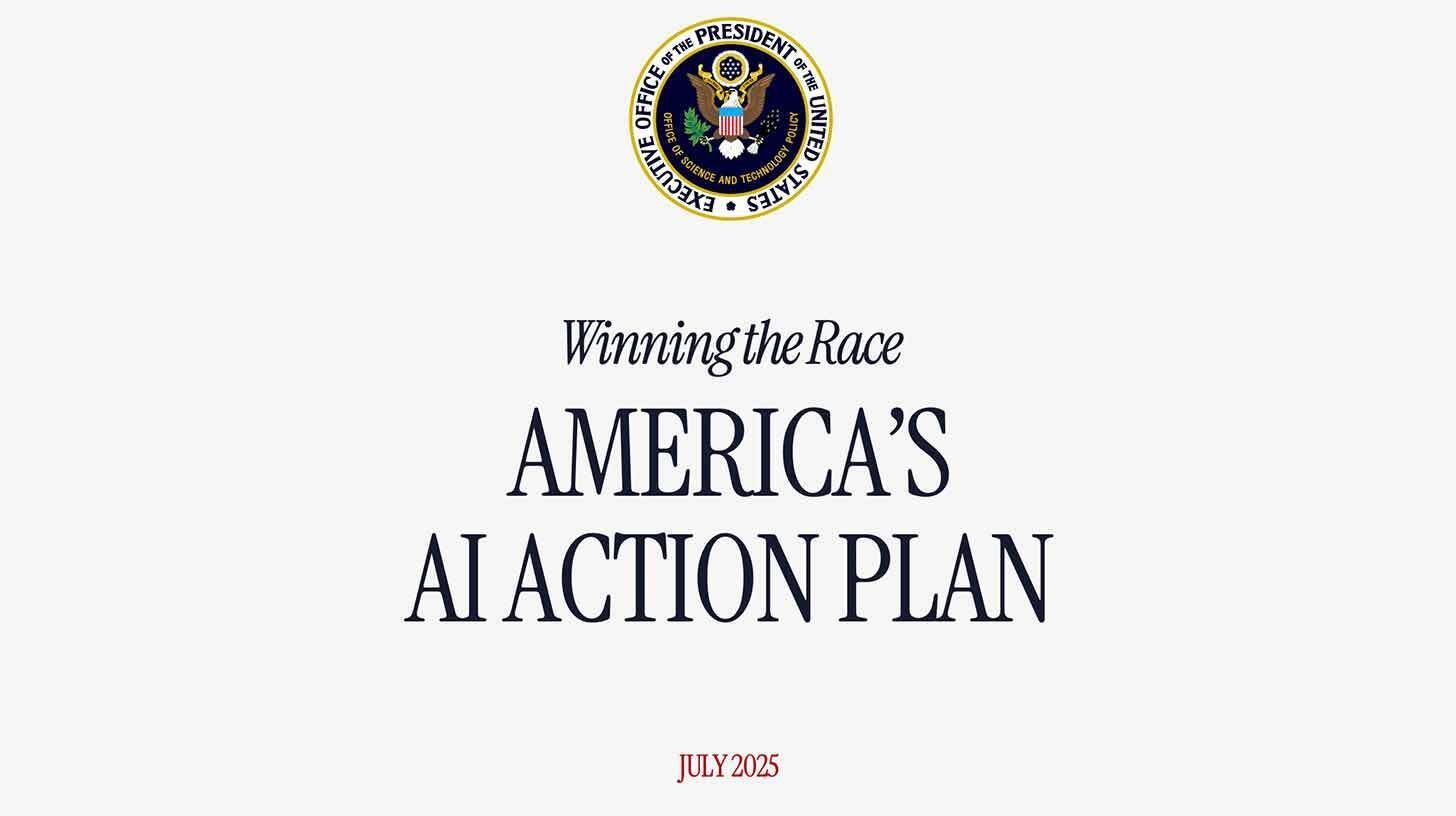
Image source: The White House
Brief: The U.S. launched its AI Action Plan, designed to strengthen economic competitiveness, enhance national security, and position the U.S. at the forefront of AI innovation and governance.
Breakdown:
The U.S. will pursue 90+ policy actions to accelerate innovation, build AI infrastructure, and lead in global AI diplomacy and national security.
The Commerce and State Departments will partner with industry to export secure, full-stack AI systems, including hardware, models, and standards.
Permitting for data centers and chip fabs will be expedited, alongside efforts to grow skilled trades like electricians and HVAC technicians.
Federal rules that hinder AI development and deployment will be reviewed and removed with input from the private sector.
Federal procurement will require LLM developers to ensure systems are objective and free from top-down ideological bias.
Why it’s important: The plan, unveiled at an event featuring policymakers and top AI CEOs, aims to elevate U.S. AI leadership through increasingly market-driven approaches. While ambitious, critics highlight the plan's lack of emphasis on AI-related risks, such as fraud and privacy violations.
WORKFORCE IMPACT
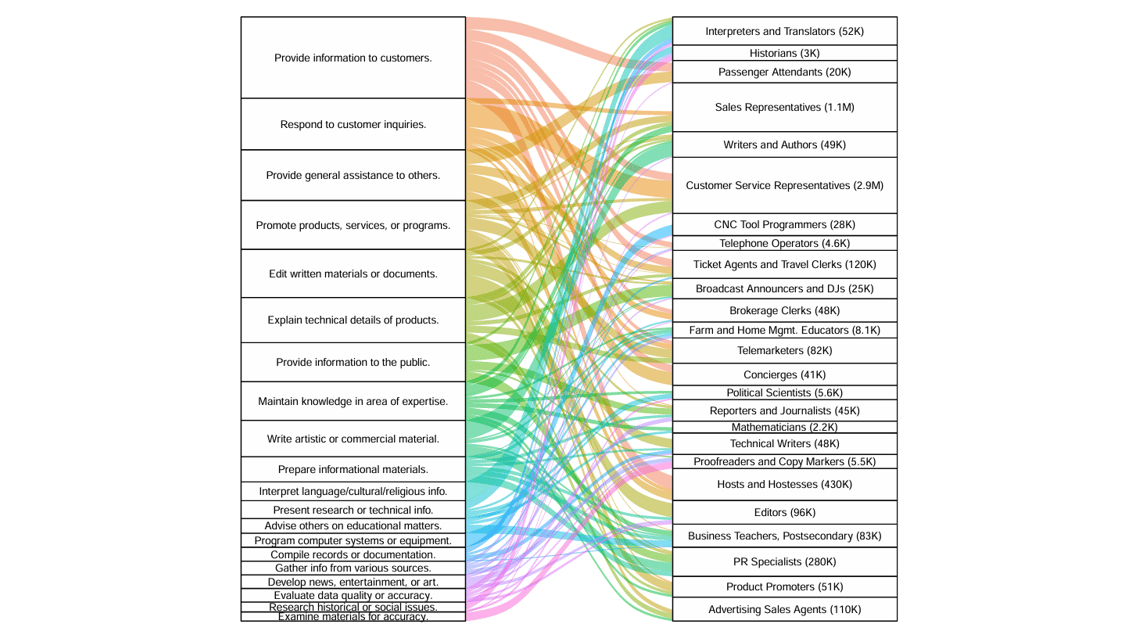
Image source: Microsoft
Brief: Microsoft analyzed 200,000 real conversations with Bing Copilot to reveal, beyond theory, which occupations are most and least impacted by AI in today’s rapidly evolving workforce.
Breakdown:
Professionals primarily use AI for gathering info and writing, while AI frequently performs tasks like advising, teaching, and information delivery.
Microsoft introduced an “AI applicability score” to quantify how significantly AI impacts the day-to-day tasks of different occupations.
The highest scores appear in knowledge-based roles in tech, admin, and sales, fields that rely heavily on communication and info exchange.
The lowest applicability scores are in physical or hands-on occupations, including nursing assistants, surgeons, and maintenance workers.
The visual above shows the 25 occupations with the highest scores (top right to bottom right) and activities (left) driving those scores.
Why it’s important: As generative AI continues to reshape how work gets done, understanding its occupational impact is increasingly important. Enterprises and employees should recognize where AI is most applicable and adapt skillsets accordingly to remain relevant in a shifting labor market.

BCG published an 18-page report on the global competition for AI talent, and insights on why "CEOs aren’t thinking big enough with AI."
L.E.K. shared a 7-page brief outlining why SaaS annual recurring revenue (ARR) is no longer enough, with new metrics supporting usage-based growth.
Google released a 29-page report on the future of advertising, focusing on scaling creative, media, and performance using AI technology.
IBM’s gen AI business hit $7.5B. Consulting accounts for $6B, with gen AI driving 17% of the backlog, 10% of revenue, and a 3-point margin gain.
OpenAI shared a case study on AI agents automating cybersecurity detection and response, alongside research on copilots improving clinic care.
Salesforce released an 18-page workforce innovation playbook for building a human agent workforce, featuring practical checklists and case studies.
McKinsey shared its 2025 outlook on frontier technologies, including agentic AI, while barring its China business from generative AI consultancy work.
Deloitte highlighted how M&A teams face rising data volumes and faster deal cycles, with multi-agent AI offering a powerful solution.

OpenAI will reportedly launch GPT-5 in August. Sam Altman warned of an AI “fraud crisis” as models defeat common bank authentication systems.
Google released Gemini 2.5 Flash-Lite, its fastest and most affordable model to date, priced at just $0.10 per million input tokens.
Microsoft launched GitHub Spark in preview, enabling Copilot Pro+ users to build apps from natural language using Claude Sonnet 4.
Alibaba unveiled Qwen3, now the top open-source LLM. It surpasses Kimi K2 and challenges leading closed-source models in performance.
Meta declined to sign the EU’s AI Code of Practice, citing legal uncertainty and overreach beyond the scope of the EU AI Act.
Nvidia chips worth over $1B, including B200s, were reportedly smuggled into China over three months despite U.S. export controls.
xAI hired a top Nvidia researcher Ethan He and aims to deploy compute equivalent to 50M H100 GPUs by the end of 2025.
Figma announced the general availability of Make, a prompt-to-code tool enabling users to transform designs into interactive prototypes.

CAREER OPPORTUNITIES
Citi - Head of AI Risk Management
J.P. Morgan - AI Transformation Vice President
Anthropic - Cloud GTM Partnerships Lead
EVENTS
McKinsey - The Future of Business - July 29th, 2025
IBM - The Enterprise AI Advantage - July 29, 2025
The Millennium Alliance - AI Transformation - 19-20 August, 2025

Initiated as a practical communication for executives with whom Lewis Walker, the editor, partners on AI transformation programs, this briefing now serves as a trusted resource for thousands of senior decision-makers shaping the future of enterprise AI.
If your AI product or service adds value to this audience, contact us for information on a limited number of sponsorship opportunities.
We also welcome feedback as we continue to refine the briefing.


